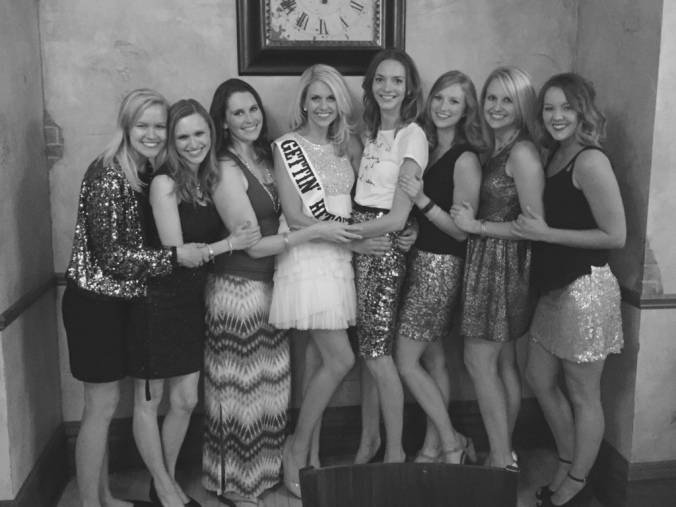Last year, I was famous.
The moment Troy proposed to me on that glorious morning of March 28, 2015, I was thrust into celebrity. Suddenly, acquaintances I hadn’t spoken to since high school were congratulating me on my engagement. Friends and family were showering me with gifts. My schedule was collecting events so fast I had to start color-coding them to keep them straight.
From March 28 on, I was no longer Sarah Schock. I was The Bride-to-Be.
Life as The Bride-to-Be was both stressful and fabulous. Every day, I was working on my wedding — emailing vendors, perusing Pinterest, scouring bridal shops, attending parties in my honor. Oh, the parties were fun! I got to sit on a throne as people told me how pretty I looked and passed presents my way. Who wouldn’t love that?
No matter what I was doing, though, I was constantly aware of myself. I could feel the heat of the spotlight shining directly on my forehead, and sometimes it made me sweat. As a self-professed introvert, I’m not often comfortable with attention. It was strange to know that so much of people’s time and money was being spent on me — all because I loved someone.
I don’t mean to sound conceited or ungrateful. This isn’t a phenomenon unique to me, after all; I imagine all brides experience the same thing. Pregnant women, too. Even those who have lost a loved one — all of these events are momentous, life-defining, and it makes sense that people start to associate you with them. I remember how, in the months after I lost my mom, I couldn’t look at anybody without seeing pity pooled in their eyes, couldn’t listen to them without hearing You poor thing saturated in every word. During that time, I was The Girl Whose Mom Died.
Something funny happens when you’re labeled like this: you begin to believe that’s all you are. In the midst of your mountain-moment, you become something like a stereotype — basic, one-dimensional, serving a single purpose to the story.
But it’s your story. As the protagonist, you’re entitled to as many dimensions as you please. You are bright and complex and bursting with quirks — you garden, you wear glasses, you take honey in your tea. You have a name.
When I was engaged, I tried hard to maintain my sense of self. It was difficult, mostly from a logistical stance; I didn’t have time to read poetry, write essays, do the things I’d normally do in my free time. I also didn’t need to. I was perfectly content to spend my days connecting with Troy, planning the biggest celebration of our lives. I don’t think there’s any shame in that, either.
Still, I didn’t want to be seen as only The Bride-to-Be. I suppose that’s the trouble with fame, isn’t it — you can never escape what you’re known for.
Until, that is, everything eventually blows over.
It’s hard to describe how drastic the difference is between your wedding day and the day that follows. It’s like muting the television screen mid-static — the silence is staggering.
Even the night of our wedding, as Troy and I rumbled away from the Wisconsin barn where we married, finally and forever alone, I felt our wedding wash away from us: a castle in sand. I sat in the dark and sobbed to Bon Iver, so full of emotion I literally could not contain it all. I wasn’t sad, per se, but the sense of finality was so palpable.
It was over. It was all over.
And yet . . . the best was still to come.
The week that followed our wedding was truly the sweetest, most wonderful week of my life. Anticipating a “real” honeymoon in the coming months, Troy and I had chosen to stay in southern Wisconsin for what I called our “mini-moon.” Aside from our accommodations, we had no agenda; we woke late each morning, made breakfast, donned scarves, and slipped into the Nitro for an unknown adventure, coffees in cupholders and Google Maps in hand.
We wound up at wineries, breweries, supper clubs, hole-in-the-wall cheese shops. There was such a relaxed air about it all. In November, the small towns of Wisconsin were quiet, quaint, covered in cloud and a hunkered-down sense of community. It was like we were wandering around a dream.
The best part about our mini-moon was that we felt so far removed from everything. Even though we were only about six hours from home, the world of Wisconsin was ours. We didn’t contact anyone the entire week, didn’t check social media or even open our laptops. It was exhilarating to know that nobody had any idea where we were.
It wasn’t necessarily that we wanted to be away from our friends and family — in fact, we wondered often about what everyone was doing back home, talked endlessly about how much they’d sacrificed to support us, how very loved and blessed they’d made us feel. Our gratitude was shared and strong.
But being together, alone and anonymous and away from it all — that was the greatest wedding gift we could have gotten.
Troy and I have been married for five months now, and while that’s hardly a milestone, much has changed since our wedding. Mostly, life is calm. We’re still busy, but we’re less stressed, and we’re more secure in who we are — as individuals and as one. We’re happy and full.
Being famous has its benefits, but I like this better.
These days, I feel more like myself. I can go to a coffee shop and spend the afternoon writing if I want. I can curl up on the couch with my husband on a Saturday night, eating ice cream and watching documentaries that teach us about culture and life. I can have conversations with people without being asked about how wedding planning is going.
(Of course, that question has been replaced with How’s married life? But that’s okay. Because married life is great, and because frankly, that’s just a courtesy question anyway. People don’t care as much about the aftermath of things.)
When you experience a major life event like this, you might feel like you’ve been pushed onstage, into a lone beam of light. You might feel as though everyone is watching you, waiting for you to trip, dance, do something. You feel the fluorescence on your face.
Your identity becomes wrapped up in that one thing: being a bride, having a baby, grieving the loss of someone you love.
Eventually, though, you go back to being yourself. You get married, you have your baby, you live — and time takes its payment, a little each day. In exchange, you get to move on.
Hopefully, your life is an accumulation, and you embrace all the people you’ve been and are: Girl Whose Mom Died, Bride-to-Be, Wife. Because the more personalities you have, the more difficult they are to pronounce. People will have to start calling you by your name, not by your reputation.
And you will have to start seeing yourself for the bright, complex, bursting-with-quirks person you are — whether you’re standing in the spotlight or waiting in the wings.
I am no longer just The Bride-to-Be. And I am no longer Sarah Schock, either. I am Sarah Klongerbo — which is an incredibly weird and wonderful thing. It’s a new identity, and it’s not. It’s who I was always meant to be.
Whatever’s going on in your life right now, remember that there is so much — so much — to who you are. You have a past and a present and a future, and they will all shape you. You are more than the person you’ve been, more than whatever you’re going through now, even more than what will happen to you in the months and years to come.
You have a name.



